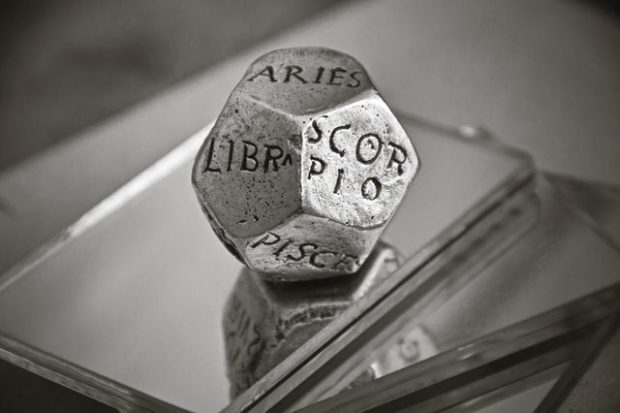You have no items in your cart. Want to get some nice things?
Go shopping
When I read Theodor Adorno’s The Stars Down to Earth, it was not because I was drawn to astrology. What interested me was the German theorist’s thought-compacted prose, to see it at work on an everyday subject. For astrology itself I have long had, if anything, the distaste that all superstition arouses in me.
This distaste is a residue of a time in my childhood (my 11th year) when I felt as if I were being driven mad by idiosyncratic superstitions. Whenever, for example, someone would touch me, especially someone I would never wish to resemble, I would have to brush off the tainted spot with my own hand. I would also surreptitiously make a sign of the cross and mentally direct it at anything or anyone who had, on sight, affected me unpleasantly. More ostentatiously, in getting into bed each night, I would have to do it by sitting down on the same spot, then turning head over heels into place. Just as noticeably to others, I would not allow myself to set foot on the grounds of a nearby church from which I had once seen a funeral procession emerge; my older brother could tease or hit me, then run onto the church steps to put himself beyond my reach. I remember, too, that whenever I concluded any action, such as drying my hands, switching off a light or closing a door, I would have to repeat that action if I could not be sure of what had been running through my head at the time: and on repeating an action—which I did often, quite as if I had developed a stutter not of speech but of movement—I would have to keep my mind blank so as not to give the mischievous magical entities with whom I seemed to be continually in negotiation anything—a dread, a desire—which they might turn against me.
And there were more of these superstitions. Thankfully, I seem to have forgotten them. Even now, it is not with complete detachment, not without reluctance and dread, that I remember that period of my childhood, a time when I lived as if within a mental hair-shirt of superstitions, most of them of my own making. We may take our cue from such inherited superstitions as walking under a ladder or having a black cat cross our path, but the superstitions that truly compel us are the personal ones that arise from psychological disturbances, those which, through a misuse of our capacity for believing in the imaginary, in visions and intuitions, we spontaneously create and secretly hold. And we can go on multiplying these self-invented superstitions until we are completely ensnared by them.
With such fantastic or magical thinking, we are trying, of course, to avert catastrophes and invite destiny’s favour, to remain special, untainted, spared for great things. But all the while superstition is itself turning into a catastrophe for us. It is turning into a compulsion, a vice, from which we may never free ourselves.
And it is a vice that is crippling to our intelligence. It leaves us unable to discern true cause from effect. Western civilization nearly came to standstill during the Dark Ages, when superstitious thinking was the norm; it got underway again only during the Renaissance, when rational thought began to reassert itself. As a child I seem to have gone through my own Dark Ages and Renaissance. Literally from one moment to the next, I grew fed up with my enslavement to fantastic thinking and bucked its tyranny over me. I ceased to care what might befall me as a consequence and resisted all superstitious compulsions. This was sometimes almost painful: I would feel the force of the compulsion tussling with my resistance, physically tugging at me, fairly burning me in spots. But afterwards, triumphant, I felt rewarded by a sense of freedom which has ever since kept me a devotee of reason, of lucidity, reluctant to attend much to anything absurd, anything to which intellection cannot be applied.
But is astrology truly based on superstition? Many of its adepts might say otherwise, that it is an ancient field of knowledge so arcane as to exceed the grasp of modern scientific understanding. I also recognise that it has played a hefty role in history, and that it was widely seen as legitimate until not too long ago, even by such a fine mind as that of the Portuguese clerk-poet Fernando Pessoa. Of course, Pessoa was a devotee of pretence, of treating reality as fiction, so he may have only been pretending to see merit in astrology.
Since the Middle Ages, we have been systematically eliminating superstition from our lives, yet it persists. It even undergoes strong revivals now and then, perhaps as a respite from a fatiguing monotony of reason and materialism. Surveys in the past decade put the belief in astrology at between a quarter and a half of the American population, and the trend is towards a rising number of believers.
In what way do they believe in it? That was not specified, but I would be surprised to learn that many believe in it entirely. It seems more probable that most are only part believers, and that only a minute number attach any importance to the advice and predictions in the popular horoscopes. Many must simply like the romantic notion that their fate (in which a large majority of Americans do believe) is influenced by the same cosmic forces that form constellations, and give astrology the benefit of the doubt because it is the discipline that most scientifically (as opposed to religiously) engages with the problems of luck, chance, destiny — those other objects of superstition which are also no doubt widely believed.
But what the largest number of people surely believe about astrology, what makes many concede that there is something to it, must be the no doubt illusory relevance of the zodiac to human temperament and character. It is a persuasive illusion and I am afraid that, in spite my abhorrence of superstition, I may have to include myself among those who are susceptible to it. To be sure, I do not know what character traits are supposed to correspond to which zodiac sign; I do not even know which birth dates define most of them. But I do know that I have often been able to divine a person’s sign when she has had it in common with someone I have known well. A small something — a way of speaking or moving or laughing, a pet phrase, a scent, the set or animation of a face, the life and light in a pair of eyes, the way hair settles on shoulders, or something more general, such as a repeated effect of someone’s company on my mood — will strongly bring to mind the earlier acquaintance.
It is usually a former girlfriend or love interest, that former acquaintance, which substantially reduces the number of signs I am inclined to guess, since Cancer, Leo and Scorpio, so far as I know, account for much of my love life. But often I also draw Taurus into my guessing game, and it happens to be the one I am most often right about. I have found that when someone is a sort of social complement to me, that person will turn out to be a Taurus.
In any case, my correct guesses on birth signs have occurred so often as to leave me at times inclined to accept that there is something to the pseudo-science of astrology. Then reason and my dislike of superstition reasserts itself and I have to concede that there are other explanations for how apparently often my zodiac guesses are right. One explanation could be mathematical, probably having to do with the fact that I do limit my guesses to only those four signs. Another explanation may have to do with psychology, or, more specifically, with a sort of optical trick of the mind. Although how often I guess correctly probably does not exceed the mathematical odds, the correct guesses are of course more impressive and thus more memorable than the incorrect, which makes them seem more numerous in recall. (And no doubt the fact that people I recognise as having a certain star do act much as I expect them to is also psychologically explicable.)
Adorno himself wastes little ink on entertaining the possibility that there might be something to astrology, or even on debunking it. As the title of his book indicates, he is simply out to bring the ostensibly readable constellations down to earth. He wishes to examine, in particular, what social or political purpose was being served by the horoscopes in the media of his time, what morality and ideology were being disseminated to the masses. This in itself was a subject of little interest to me, but I read on, and as I did, ideas of my own emerged.
It was not that Adorno made me wish to rise to the defence of astrology. But I did, mainly through the horoscopes he cited in his book (although he did not make this point himself), begin to see how these might be feasibly regarded as a popular literature of the everyday. It may even be the only continually produced literature that tries to take into account, even if with little intelligence or originality, forces that I had myself grown concerned with at the time — the forces that make for the peculiar character of each day, that we ought to surf nimbly so as to ensure a successful 24 hours and ultimately a tolerable life, especially when we find ourselves living day to day without the shadow of a master plan.
Each day, I believe, has a story of its own, and it is one that horoscopes, which can be regarded as a form of speculative literature, a science-fiction, of the everyday, ostensibly tell in advance. The themes, patterns and mysteries in the grain of each day’s reality, the small but confounding, coin-flip choices that have to be made in the course of a day’s hours, bits of news, slivers of opportunity, the ebb and flow of moods: this is the stuff that horoscope writers trade in, as if it all could only lay within the province of superstition or fictions based on it, being too ineffable to yield to conscious method or be worthy of a more serious literary form or even a genuine science. Yet I subsequently discovered that Siegfried Kracauer, a colleague of Adorno’s at the Frankfurt School of Social Research, wrote that we ought to “rid ourselves of the delusion that it is major events which most determine a person. He is more deeply and lastingly influenced by the tiny catastrophes of which everyday existence is made up.”

About Carlos Cunha
CARLOS CUNHA's writing has appeared in The Kenyon Review, TriQuarterly, The Los Angeles Review of Books, The Seattle Review, Britain's Manchester Review, Litro, the American Journal of Poetry and elsewhere. He is a past winner of the William Faulkner writing contest in New Orleans, and Gulf Coast magazine's annual contest. Born in Portugal, he grew up in South Africa and lives in Florida, where he works as a copy editor for The New York Times International Weekly.



